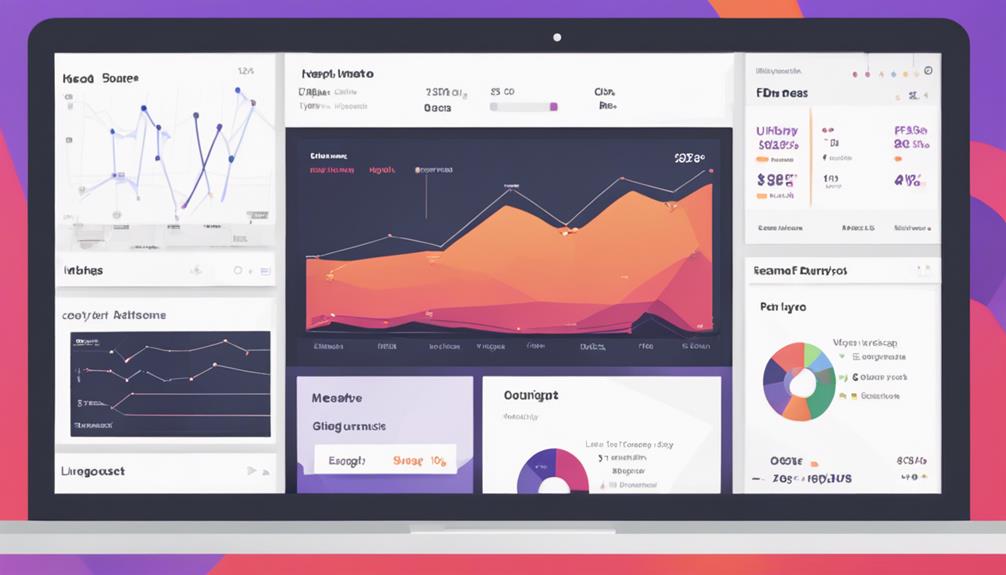You might not realize that evaluating keyword competition can significantly impact your digital marketing strategy's success. The right tools can help you uncover hidden opportunities and optimize your approach, but which ones should you trust? Google Keyword Planner might be familiar, but what about the advanced metrics offered by Ahrefs or the comprehensive insights from SEMrush? Each tool has its strengths, and understanding these can be the key to outsmarting your competitors. There's a lot more to explore, and knowing where each tool excels could transform your keyword strategy. Are you ready to optimize your keyword game?
Google Keyword Planner
Google Keyword Planner is a powerful tool for strategic SEO analysis, providing you with essential data to optimize your digital marketing efforts. By leveraging its capabilities, you can enhance your keyword strategy through precise data and informed decision-making.
Start by entering seed keywords relevant to your business. Google Keyword Planner will generate a list of related keyword ideas, complete with search volume statistics, competition levels, and bid estimates. This data serves as a foundation for crafting a robust SEO strategy.
When analyzing competition, focus on the "Competition" column. This metric indicates how many advertisers are bidding for each keyword, giving you an idea of the keyword's popularity and potential difficulty in ranking. Low competition keywords might be ideal for quick wins, while high competition terms suggest a need for more intensive SEO efforts.
Pay attention to the "Average Monthly Searches" metric, which reveals the keyword's search demand. A high search volume indicates significant interest, but it might also mean stiffer competition. Balancing search volume with competition allows you to identify keywords that are both achievable and valuable.
Utilize the "Top of Page Bid" range to gauge the commercial value of keywords. Higher bids often correlate with keywords that lead to conversions, providing insights into which terms could be most profitable for your campaigns.
To maximize your keyword strategy, export the data and analyze it alongside your existing SEO metrics. This will ensure a comprehensive understanding of your market landscape.
Google Keyword Planner empowers you to make data-driven decisions, ultimately enhancing your visibility and effectiveness in the digital space.
Ahrefs Keyword Explorer

While Google Keyword Planner lays a strong foundation for keyword strategy, Ahrefs Keyword Explorer offers an advanced level of analysis that can further refine your approach. This tool provides comprehensive insights into keyword difficulty, search volume, and potential traffic, enabling you to make informed, data-driven decisions.
At the core of Ahrefs is its keyword difficulty score, which ranges from 0 to 100, quantifying the effort required to achieve a top 10 ranking. By evaluating factors like backlink profiles of competing pages, you can strategically assess your chances of ranking successfully.
Ahrefs doesn't just stop at keyword difficulty. It delivers a wealth of data on search volume trends, click metrics, and return rate. You'll see not only how often a keyword is searched but also how many people actually click on search results. This click data is crucial for understanding user intent and optimizing your content to meet their needs.
Additionally, the return rate metric indicates how often users return to search for the same keyword, helping you gauge the long-term value of targeting specific keywords.
Moreover, Ahrefs allows you to dissect SERP features, providing insights into whether features like featured snippets or local packs could impact your visibility. You can analyze competitors' top-ranking pages and their backlink strategies, which is invaluable for identifying content gaps and opportunities in your niche.
Armed with this strategic analysis, you can prioritize keywords that align with your business goals and SEO capabilities, ensuring your efforts yield optimal results. Ahrefs Keyword Explorer is indispensable for anyone serious about mastering keyword competition.
SEMrush Keyword Tool

Among the plethora of keyword research tools available, SEMrush stands out with its robust capabilities that can elevate your SEO strategy to new heights. SEMrush's Keyword Tool offers a comprehensive suite of features that enable you to analyze keyword competition with precision. By leveraging its data-driven insights, you can make strategic decisions to optimize your content and maximize visibility.
SEMrush provides detailed metrics such as Keyword Difficulty, Search Volume, and CPC (Cost Per Click). These metrics are essential for understanding the competitive landscape and prioritizing your target keywords effectively. Here's a quick breakdown of SEMrush's key features:
| Feature | Description |
|---|---|
| Keyword Difficulty | Measures how hard it is to rank for a keyword. |
| Search Volume | Displays the average number of monthly searches. |
| CPC | Indicates the average cost per click for paid search results. |
| SERP Features | Shows the presence of special search result features. |
Using SEMrush, you can dive into SERP (Search Engine Results Page) analysis to identify which competitors are ranking for your desired keywords. This allows you to uncover gaps in your content strategy and explore opportunities for improvement. The tool's ability to reveal SERP features like featured snippets and local packs helps you tailor your approach to capture these valuable spots.
Furthermore, SEMrush provides trend data, enabling you to track keyword performance over time. This historical data is crucial for understanding seasonal variations and adjusting your strategy accordingly. By incorporating SEMrush into your workflow, you gain a competitive edge, ensuring your SEO efforts are data-driven and strategically aligned for success.
Moz Keyword Difficulty

To effectively navigate through the challenges of SEO, Moz's Keyword Difficulty tool offers precision insights into the competitive landscape of keywords. By leveraging this tool, you can strategically assess how hard it's to rank for specific keywords in search engine results.
Moz provides a percentage score that indicates the difficulty of ranking, factoring in domain authority, page authority, and the quality of backlinks pointing to the competing pages.
When you analyze keywords using this tool, you're not just looking at numbers. The Moz Keyword Difficulty tool integrates data-driven metrics, allowing you to prioritize keywords that align with your site's strengths.
For instance, if a keyword shows a high difficulty score, it might require significant resources to rank effectively. Conversely, lower scores can signal opportunities for quick wins, especially if your content and backlinks are competitive.
A strategic approach involves balancing high-volume keywords with varying difficulty levels. The insight Moz provides can guide you in crafting a keyword strategy that optimizes for both immediate traffic and long-term growth.
Dive into the SERP analysis feature, which shows you the top-ranking pages for each keyword, complete with vital metrics like domain authority and backlink profiles. This data is crucial for understanding the competitive landscape and identifying gaps you can exploit.
Ubersuggest Analysis

When you're looking to refine your SEO strategy, Ubersuggest emerges as a valuable tool, providing comprehensive keyword insights and competitive analysis. By leveraging its capabilities, you can tap into a vast database of keywords to assess their difficulty, search volume, and cost-per-click (CPC). This data-driven approach is crucial for making informed decisions that align with your strategic goals.
Ubersuggest excels in delivering precise keyword metrics, allowing you to evaluate how challenging it will be to rank for specific terms. The tool's keyword difficulty score is an essential metric, calculated based on factors like domain authority and backlinks of top-ranking pages. You can use this score to prioritize keywords that balance search volume with achievable competition levels.
Here's a clear breakdown of what you can expect from Ubersuggest's keyword analysis:
| Metric | Description |
|---|---|
| Keyword Difficulty | A score from 0 to 100 indicating how hard it is to rank for a keyword. |
| Search Volume | The average number of searches a keyword receives per month. |
| Cost-Per-Click (CPC) | The average cost advertisers pay for a click on an ad for this keyword. |
| SEO Difficulty | Insight into the effort required to rank organically for the keyword. |
Strategically, Ubersuggest empowers you to identify low-hanging fruits—keywords with moderate difficulty but high search volume. This enables a tactical focus on terms where you can realistically improve your search engine rankings. Additionally, the tool's ability to provide competitor analysis gives you a competitive edge by revealing the keywords your competitors are targeting, offering you a chance to capitalize on their weaknesses. By integrating Ubersuggest into your SEO toolkit, you position your strategy for data-driven success.
Conclusion
So, you've got your arsenal of keyword tools, ready to conquer the digital battlefield. Google Keyword Planner whispers sweet nothings of search volumes, while Ahrefs arms you with difficulty metrics. SEMrush peeks at your rivals' rankings like a nosy neighbor, and Moz tells you just how doomed you are with domain authority. Then there's Ubersuggest, the ultimate fortune teller, predicting SEO success. Armed with these, you're practically a keyword wizard—minus the wand and pointy hat.


